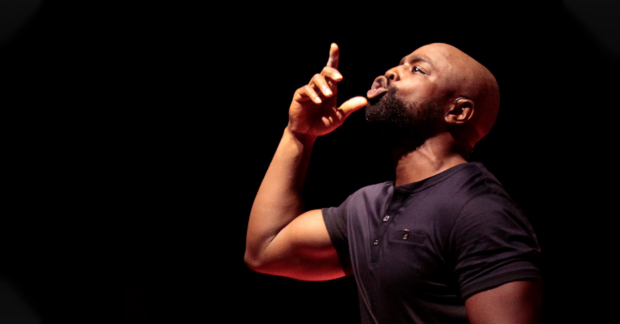Review: Death of England – Delroy (National Theatre)
The National Theatre has an opening night – for a show now closed with the new lockdown

© Normski Photography
There's an old Broadway joke about the show that opens and closes on the same night because the reviews are so bad. But as Rufus Norris, artistic director of the National Theatre reminded the audience in a warm welcome to the newly-reopened Olivier auditorium, this is probably the first time a play has closed after press night because of a virus.
The truth is that Death of England – Delroy, by Roy Williams and Clint Dyer (who also directs) would in normal circumstances have run and run. It's a swaggering, sensitive and vital portrayal of what it feels like to be a working-class black man in Britain today, which manages to pack considerable complexity into its 90-minute running time.
It was written in response to last year's triumphant Death of England, in which Michael (Rafe Spall) responded to the death of his racist father with a tormented monologue about Brexit, patriotism and loss. Delroy is his black best friend, born in Britain to Jamaican parents, and this new play springs from one line in the old: "You may look like us, you may sound like us, but you will never be one of us."
We first meet Delroy in a double lockdown – trapped in his flat not only by Covid-19 but by an electronic tag. He then takes us back through the repercussions very bad day, when he was on his way to the hospital to hold the hand of Carly (Michael's sister) as she gives birth to their first child, when he is detained by the police and ends up in a cell.
The story is told with great energy, and many voices, all of which Michael Balogun embodies as he races through the tale. The writing is fantastic – muscular, twisting, funny, both colloquial and poetic. It's also textured and difficult. The writers don't make it easy for themselves; Delroy is not a liberal, but a Brexit-voting bailiff, proud of his self-sufficiency and his success. "I voted for Boris. Twice," he exclaims, in fury, when he finds himself arrested.
What the play and the performance brilliantly explore is not only Delroy's anger at his exclusion by the society he has so vigorously embraced, the way that the colour of his skin defines him more than any other quality, but also his enormous vulnerability: his fear when he is arrested is what makes him so aggressive; being told what he is and what he is supposed to be in his own country is what makes him feel so empty and hollowed-out.
The descriptions have the feeling of lived experience, of a profound understanding which the production conveys with a bravura vigour. The Olivier has been reconfigured in the round and even with only 500 people inside, feels full of life (which bodes well for the Christmas pantomime the National plans to present post-lockdown.) In Ultz's design two walkways, covered with red paper, like the English flag, provide Balogun with an arena, which he races around with impressive speed, commanding the space.
Sometimes, the production feels slightly too anxious, adding effects and noise that confuse rather than point its meaning. But given that Balogun only stepped into the role when the first cast Giles Terrera had appendicitis, this lack of bedding down feels forgivable. And the greatest tribute Balogun is that you would never know he started out as the understudy; he makes the part fit him like a glove, catching all the character's lively, boisterous energy, his anger and above all his pain.
It's a charismatic performance at the heart of an urgent play. The National filmed the production and plan to make it available digitally; look out for it. It is not only a blistering piece of stagecraft and acting, but it precisely fulfils one of theatre's functions of adding understanding and depth to the political debate.












